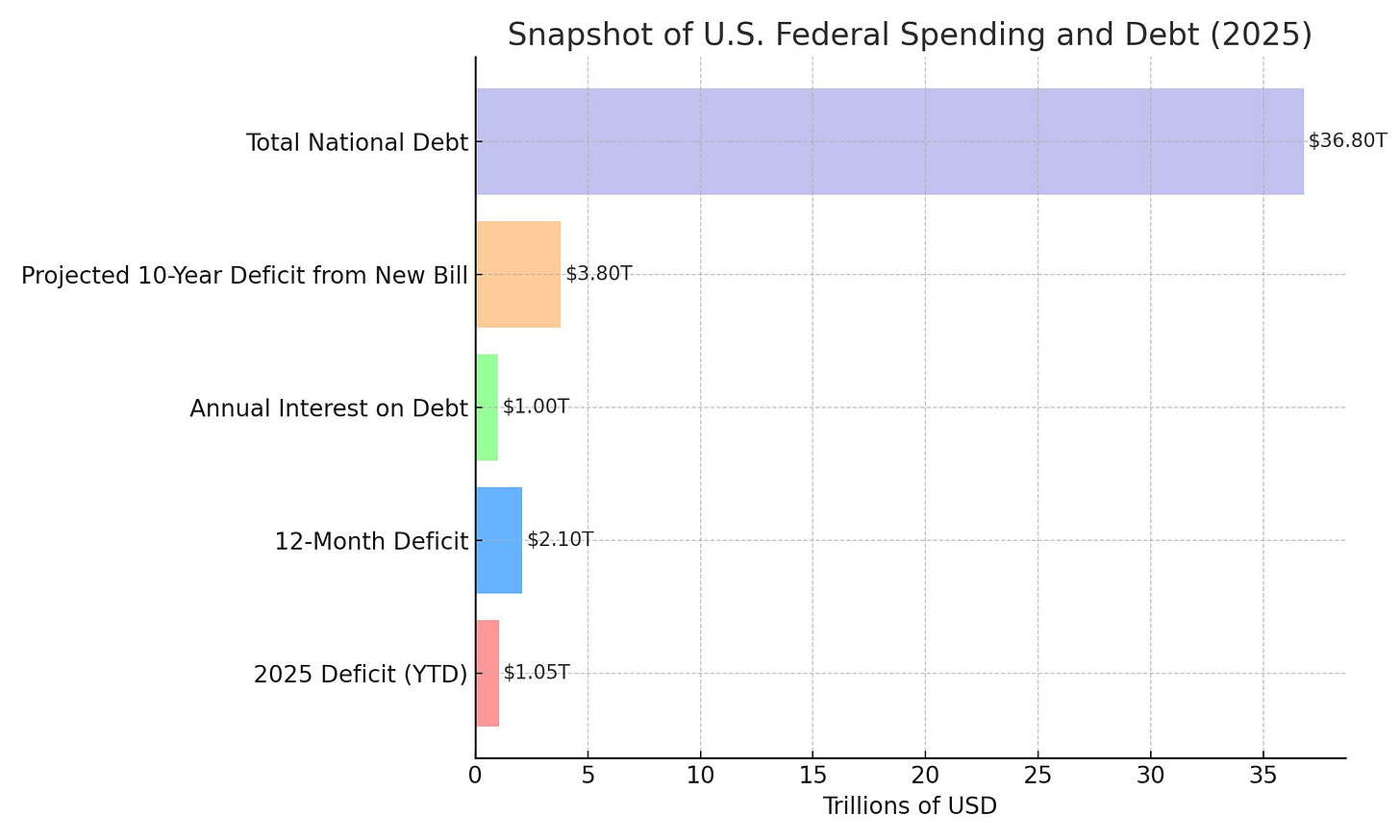"Wait, That’s a Trillion?"
A time travel lesson in budgets, deficits, and not ghosting your democracy.
Full disclosure, I let ChatGBT do all the typing of this article, all I did was dictate my ideas, and an article that I have had percolating for weeks is now done. It feels a bit like cheating. The AI doesn’t say things exactly as I might have during my hours of writing and typing, but it did get this article done within an hour. All I did was dictate, tweak, and offer up suggested changes until I finally had something close to what’s been floating around in my head.
I hope this lesson gives you a mental image of the real difference between a million, billion, trillion. It’s not just about adding three more zeros, and I hope that you’re okay with my using AI to get most of the hard work done. The AI even created an image for me to reinforce the idea.
Enough excuses, here we go, my student has a issue, and we are about to dive in:
Student:
Okay, I’m supposed to be learning about government spending for econ, but I don't get why everyone freaks out over deficits. I mean, it’s all pretend money anyway, right?
Tutor:
Pretend money that racks up real interest. Want to understand the difference between a million, a billion, and a trillion?
Student:
Sure. But numbers that big all feel the same: “a lot.”
Tutor:
Good. Then let’s give them weight. Let’s use time. You like time, right? Minutes? Days?
Student:
Better than numbers, honestly.
Tutor:
Great. Then you do the math. I want you to figure out how long ago one million minutes was. Not Google. Use your brain.
Student:
Ugh. Okay. Let me think. There are 60 minutes in an hour, 24 hours in a day… that’s 1,440 minutes a day. So one million divided by 1,440 is... about 694 days. Almost two years.
Tutor:
Good. Two years ago. What were you doing?
Student:
Uh... stressing about finals. Learning to parallel park. Watching everyone freak out about the election polls.
Tutor:
Right. That’s how close a million is. You remember that. It was recent. Now. Same drill. One billion minutes.
Student:
Okay… wow, okay, a billion divided by 1,440 is… whoa. Over 694,000 days. That’s like… wait, around 2,000 years?!
Tutor:
Give or take. Roughly the year 100 AD.
Student:
That’s insane. Romans. No electricity. No cars. Christianity was just starting, right?
Tutor:
Exactly. Picture how different the world was. Not just your world—the world. Now do a trillion.
Student:
A trillion divided by 1,440 is… [tapping calculator]... nearly 700 million days. That’s like… 1.9 million years?!
Tutor:
Yep. Pre-human. Homo sapiens hadn’t evolved yet.
Student:
So when people talk about trillion-dollar budgets… they're talking about something that huge?
Tutor:
That’s the scale. Not just more zeroes—entire ages of time. That’s why scale matters. Otherwise, people tune out. They think a trillion is just "a lot more" than a billion. It’s not. It’s a completely different universe.
Student:
Okay, I get it now. It’s not just that a trillion is bigger. It’s that it’s so much bigger we can’t afford to not take it seriously.
Tutor:
Exactly. You don’t have to be an economist to care. These aren’t just big scary numbers floating in the ether—they’re bills. And guess who’s going to be paying the interest on them?
Student:
[Gulp] My generation?
Tutor:
Bingo. The deficit is a delayed bill. Right now, we’re charging everything to the national credit card. And when the interest comes due, it’s not going to be my retirement fund on the line. It’ll be your opportunities. Your taxes. Your future.
Student:
How much is the deficit again?
Tutor:
Here’s a chart that shows you.
Student:
So what would the current national debt be in minutes?
Tutor:
If each dollar represented one minutes, you would have 36.8 trillion minutes.
Student:
So how long ago was that?
Tutor:
What is 36 and 36?
Student:
Umm, 72?
Tutor:
So we’re talking roughly 72 million years ago.
Student:
And what was the earth like 72 million years ago?
Tutor:
Seventy-two million years ago, dinosaurs were still the dominant life forms—massive creatures like Tyrannosaurus rex and Triceratops roamed across lush, forested landscapes. The continents hadn’t yet drifted into their current positions, and a shallow sea split what we now call North America in two. There were no humans, no primates, not even mammals larger than a mouse. The climate was warm and humid, with flowering plants just beginning to outcompete ancient ferns and conifers. The skies were alive with flying reptiles like pterosaurs, and birds were only starting to emerge from their dinosaur ancestors. It was a vibrant, dangerous, and utterly alien world—long before anything resembling civilization came into being.
Student:
That’s one big number.
Tutor:
Now you’re getting it. It’s also why understanding this stuff matters. If you don’t want to get stuck paying off someone else’s drunken weekend in Vegas, you need to know when to say, “Hey—what are we spending this on, and why?”
Student:
Okay, so what do I do with all this?
Tutor:
Stay awake. Stay curious. And most importantly? Stay involved. Find out who your representatives are. Follow how they vote. Reach out. Even just once in a while. You don’t have to become a full-time activist—but don’t be a ghost either.
Student:
You think they'll actually listen?
Tutor:
Not always. But sometimes, yes. Especially when enough of you speak up. Democracy isn’t automatic—it’s a contact sport. And the scoreboard only works if people are watching. A Representative who won’t talk to you, and actually represent your needs, ought to be challenged.
Student:
Alright then. One mildly panicked teenage constituent coming right up.
Tutor:
Perfect. However, panic is not recommended. Informed awareness is.
Student:
[Half-grinning, still thinking] You said you made a video about this stuff?
Tutor:
I did. A long time ago. Back when YouTube still looked like a community college project.
Student:
[Typing] What’s it called?
Tutor:
HistoryBusters. All one word. I uploaded it under my full name—Lynn Marie Sager.
Student:
[Pauses, tilts head at phone screen] Oh my God. Is this you?
Tutor:
[Chuckles] Yep. That’s me approximately 11,000,000 minutes ago.
Student:
[Watches a moment, then blurts] This is so cool! Why didn’t you do more of these?
Tutor:
[Shrugs] Honestly? One of the only comments I got was from some lady who pointed out I had something in my hair. That was her big takeaway.
Student:
What?
Tutor:
Yup. All that work—scripting, filming, editing—and her entire feedback was “You had something in your hair. It was distracting.”
Student:
People can be so rude.
Tutor:
People are…complicated. And sometimes discouraging. But the thing is, I didn’t stop because it wasn’t worth doing. I just forgot for a bit that it was.
Student:
Well, I’m glad you remembered.
Tutor:
Me too.
Student:
Now, stop talking and let me watch what you were doing back in 2005. Or should I say, 11,000,000 minutes ago.
Tutor:
Okay, but I warn you, something is up with the sound track. When I posted it all those minutes ago, the sound was loud and clear, but now? Let’s just say that I hope you don’t mind reading lips.
Student:
I’ll risk it for a chance to make fun of you after.
If this article helped you really feel the difference between “meh, numbers” and “whoa, scale,” forward it to someone who still thinks a trillion is just a big round number.
And if you haven’t already, find out who represents you. Drop them a note. Ask them what they’re doing with your future.
Just a thought, and happy navigating.






